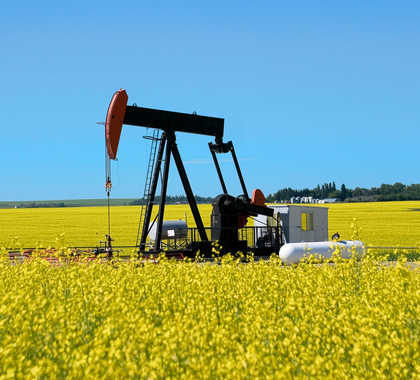A new study published in Environmental Science & Technology, funded by the National Science Foundation and U.S. Geological Survey, and conducted by researchers at Penn State University (PSU), found virtually no methane contamination of groundwater sources near oil and natural gas well sites located in Pennsylvania. Most of the natural gas produced in Pennsylvania is the result of hydraulic fracturing processes, commonly called “fracking.”
The PSU researchers took 20,751 samples across the Keystone State and found “possible” signs of methane contamination in only 17 samples, or just 0.08 percent of samples. To put it another way, 99.92 percent of the samples came back free of methane.
“Of the 17 samples that came back positive for new methane, 13 came from the northeast,” a press release from Penn State notes. “None came from sites within 2,500 feet of known […] wells. State law holds oil and gas companies responsible for methane leaks that affect wells within that 2,500-foot area.”
It is also important to note that methane in groundwater is a naturally occurring phenomenon in Pennsylvania and may not necessarily be the result of drilling activity. “It’s not uncommon to see methane in groundwater in the Marcellus shale and other shale plays,” said Tao Wen, one of the study’s researchers. “Also, if methane had been in the groundwater for a long time, bacteria would have reduced the iron and sulfate. The reduced forms would have precipitated as iron sulfide, or pyrite.”
Another study from this group of researchers, published in May 2018, analyzed data from 11,000 groundwater samples taken from 1,385 natural gas wells in Bradford County. The researchers found “no statistically significant deleterious impact on ten analytes related to the aggressive increase in development of unconventional shale-gas since 2008.” They also found “an overall trend of improving water quality” in the county, “despite heavy Marcellus Shale development.”
Despite fearmongering to the contrary, there is no evidence that seepage of fracking fluids, oil, or natural gas from fracking wells systemically contaminate water sources. Since 2010, more than two dozen independent studies have not found any systemic impact caused by the 110,000 oil and natural gas wells in operation across the country. Moreover, these studies are affirmed by the Environmental Protection Agency’s own $29 million, six-year study of fracking’s benign impact on groundwater sources.
The massive increase in domestic shale development, led by fracking, has caused natural gas prices to plummet in Pennsylvania, saving commonwealth residents and businesses more than $30.5 billion from 2006 to 2016, according to a September 2018 study from the Consumer Energy Alliance.
It should come as no surprise that shale development is spurring economic growth across Pennsylvania. Hydraulic fracturing activity delivers $1,300 to $1,900 in annual benefits to local households, including “a 7 percent increase in average income, driven by rises in wages and royalty payments, a 10 percent increase in employment, and a 6 percent increase in housing prices,” according to a December 2016 study conducted by researchers at the University of Chicago, Princeton University, and the Massachusetts Institute of Technology.
Furthermore, a 2016 Chamber of Commerce study estimated that the fracking revolution generated $13 billion in state GDP, $7.2 billion in wages, and supported more than 117,000 downstream and upstream jobs in 2015 alone. Additionally, the oil and natural gas industries supported more than 322,000 jobs in Pennsylvania in 2015, producing $23 billion in wages and $44.5 billion in economic impact, according to a 2017 American Petroleum Institute study prepared by PricewaterhouseCoopers.
In light of the immense number of studies showing fracking is relatively safe and provides substantial economic benefits, lawmakers should not ban fracking, place a moratorium on, or place onerous regulations on drilling activity. Of course, this does not mean energy companies shouldn’t continue to develop technologies that make the fracking process safer or more efficient. Nothing is meant to suggest there are zero risks associated with fracking or other drilling operations. However, those risks are quite small compared to the enormous benefits fracking continues to provide to Pennsylvania.
The following documents provide more information about hydraulic fracturing and fossil fuels.
Debunking Four Persistent Myths about Hydraulic Fracturing
https://heartland.org/publications-resources/publications/debunking-four-persistent-myths-about-hydraulic-fracturing
This Heartland Institute Policy Brief by Policy Analyst Timothy Benson and former Heartland communications intern Linnea Lueken outlines the basic elements of the fracking process and then refutes the four most widespread fracking myths, providing lawmakers and the public with the research and data they need to make informed decisions about hydraulic fracturing.
Everyday Energy for Pennsylvania
https://consumerenergyalliance.org/cms/wp-content/uploads/2018/08/CEA-Pennsylvania-Report.pdf
This report from the Consumer Energy Alliance examined how the shale revolution across the Marcellus region has provided benefits to Pennsylvania’s energy consumers by boosting disposable income and revitalizing communities, saving residential users $13.3 billion, and commercial and industrial users $17.2 billion.
The Local Economic and Welfare Consequences of Hydraulic Fracturing
https://heartland.org/publications-resources/publications/the-local-economic-and-welfare-consequences-of-hydraulic-fracturing
This comprehensive study published by the National Bureau of Economic Research says fracking brings, on average, $1,300 to $1,900 in annual benefits to local households, including a 7 percent increase in average income, a 10 percent increase in employment, and a 6 percent increase in housing prices.
Local Fiscal Effects of a Drilling Downturn: Local Government Impacts of Decreased Oil and Gas Activity in Five U.S. Shale Regions
http://www.rff.org/files/document/file/RFF%20Rpt-SPF.pdf
This study from Resources for the Future finds 82 percent of communities in the five largest shale regions in the United States experienced a net fiscal benefit from hydraulic fracturing despite a large drop in oil and natural gas commodity prices starting in 2014.
Impacts of the Natural Gas and Oil Industry on the U.S. Economy in 2015
https://heartland.org/publications-resources/publications/impacts-of-the-natural-gas-and-oil-industry-on-the-us-economy-in-2015
This study, conducted by PricewaterhouseCoopers and commissioned by the American Petroleum Institute, shows that the natural gas and oil industry supported 10.3 million U.S. jobs in 2015. According to the Bureau of Labor Statistics, the average wage paid by the natural gas and oil industry, excluding retail station jobs, was $101,181 in 2016, which is nearly 90 percent more than the national average. The study also shows the natural gas and oil industry has had widespread impacts in each of the 50 states.
What If … Hydraulic Fracturing Was Banned?
https://heartland.org/publications-resources/publications/what-if-hydraulic-fracturing-was-banned
This is the fourth in a series of studies produced by the U.S. Chamber of Commerce’s Institute for 21st Century Energy. It examines what a nationwide ban on hydraulic fracturing would entail. The report’s authors found by 2022, a ban would cause 14.8 million jobs to “evaporate,” almost double gasoline and electricity prices, and increase natural gas prices by 400 percent. Moreover, cost of living expenses would increase by nearly $4,000 per family, household incomes would be reduced by $873 billion, and GDP would be reduced by $1.6 trillion.
What If … America’s Energy Renaissance Never Happened?
https://heartland.org/publications-resources/publications/what-ifamericas-energy-renaissance-never-actually-happened
This report by the U.S. Chamber of Commerce’s Institute for 21st Century Energy examines the impact the development of shale oil and gas has had on the United States. The report’s authors found that without the fracking-related “energy renaissance,” 4.3 million jobs in the United States may not have ever been created and $548 billion in annual GDP would have been lost since 2009. The report also found electricity prices would be 31 percent higher and gasoline prices 43 percent higher.
Climate Change Reconsidered II: Fossil Fuels – Summary for Policymakers
https://heartland.org/publications-resources/publications/climate-change-reconsidered-ii-fossil-fuels—summary-for-policymakers
In this fifth volume of the Climate Change Reconsidered series, 117 scientists, economists, and other experts assess the costs and benefits of the use of fossil fuels by reviewing scientific and economic literature on organic chemistry, climate science, public health, economic history, human security, and theoretical studies based on integrated assessment models (IAMs) and cost-benefit analysis (CBA).
The Social Benefits of Fossil Fuels
https://heartland.org/publications-resources/publications/the-social-benefits-of-fossil-fuels
This Heartland Policy Brief by Joseph Bast and Peter Ferrara documents the many benefits from the historic and still ongoing use of fossil fuels. Fossil fuels are lifting billions of people out of poverty, reducing all the negative effects of poverty on human health, and vastly improving human well-being and safety by powering labor-saving and life-protecting technologies, such as air conditioning, modern medicine, and cars and trucks. They are dramatically increasing the quantity of food humans produce and improving the reliability of the food supply, directly benefiting human health. Further, fossil fuel emissions are possibly contributing to a “Greening of the Earth,” benefiting all the plants and wildlife on the planet.
Nothing in this Research & Commentary is intended to influence the passage of legislation, and it does not necessarily represent the views of The Heartland Institute. For further information on this subject, visit Environment & Climate News, The Heartland Institute’s website, and PolicyBot, Heartland’s free online research database.
The Heartland Institute can send an expert to your state to testify or brief your caucus; host an event in your state; or send you further information on a topic. Please don’t hesitate to contact us if we can be of assistance! If you have any questions or comments, contact Heartland’s Government Relations department, at [email protected] or 312/377-4000.




